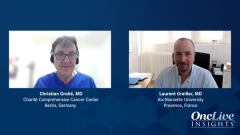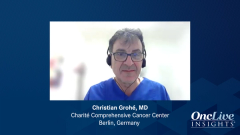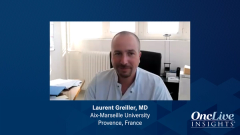
Small Cell Lung Cancer: What is the Role of Biomarker Testing?
Shared insight on the early but evolving role of biomarker testing in patients diagnosed with extensive- or limited-stage small cell lung cancer.
Episodes in this series

Transcript:
Laurent Greiller, MD:What would be interesting is to discuss if we have any predictive or prognostic biomarkers beyond the clinical one I was mentioning to guide our strategies. What do you think, Dr Grohé?
Christian Grohé, MD: In terms of understanding how we are going to treat these patients, you already alluded to the point that patients can present with a very poor [ECOG] performance status. If we can initiate treatment, they do better. Still, at our institution, Charité Comprehensive Cancer Center [in Berlin, Germany], 1 out of 5 patients do not make it to first-line therapy because they’re too sick. Their performance status…is 3 or 4. So this is an interesting issue. What would be the most important biomarker to help guide our treatment options? Honestly, there are a few. Maybe in standup care, something such as LDH [lactate dehydrogenase]. Sometimes if your patient has elevated liver enzymes, [you may] look for neuroendocrine markers, which are circulating. My personal belief is the clinical context is pretty much like it is with a hematology disorder. If you have a very high cell turnover, this is just an indicator of massive disease burden. This is basically what you’re looking for…. We might discuss a little bit later that small cell lung cancer [has] 4 different kinds of subtypes. This is part of the histology and the genetic analysis of the tumor, which does not play a role at the beginning of the first initiation of first-line therapy. We are still at the very beginning of using or having useful biomarkers for all patients with small cell lung cancer, in my opinion. I don’t know if you, Dr Greiller, share this opinion.
Laurent Greiller, MD: I totally agree with you. It’s a subgroup of lung cancer patients in which we’re needing additional biomarkers because honestly, we don’t really have them today.
Christian Grohé, MD:It’s a clinical decision, how to treat and when to treat. It’s pretty much an acute disease. Once we have the diagnosis, we should start.
Transcript edited for clarity.






































